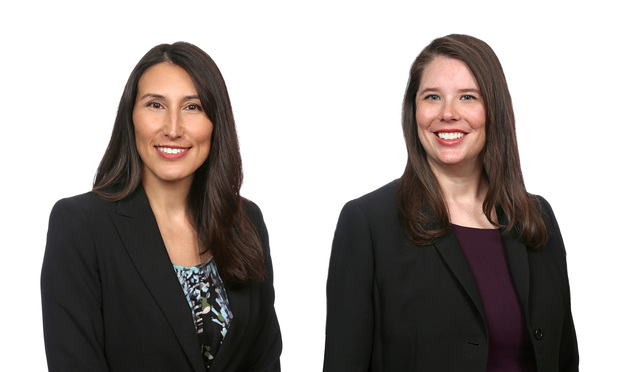The Importance of Diversity in Law Firms
Dentons' Shari Klevens and Alanna Clair highlight steps that lawyers and law firms are taking to recognize and attempt to remedy inequities inherent in the practice of law.
July 31, 2020 at 05:19 PM
6 minute read
 Shari Klevens, left, and Alanna Clair, Dentons
Shari Klevens, left, and Alanna Clair, Dentons
The recent developments in our country have led many individuals and businesses to examine their own values and actions when it comes to the treatment of Black Americans and other marginalized groups. The lack of diversity in law firms has been a well-publicized issue, and many law firms have previously recognized the need to recruit and promote diverse attorneys. However, recent events underscore the urgency of the issue and highlight the ongoing inequality in the legal industry despite those past efforts.
Indeed, according to the 2019 Vault/MCCA Law Firm Diversity Study, 81.69% of lawyers in law firms are white or Caucasian. The numbers are even less representative at the partnership levels, where 89% of partners are white, less than 24% are women, 2% are Black, less than 3% are Hispanic or Latinx, less than 4% are Asian American, and less than 2% are openly LGBTQ.
Bar associations have attempted to address discrimination in the practice of law, including through the adoption of rules specifically targeting discrimination as it relates to a law firm's hiring practices. Rule 8.4.1(b)(iii) of the California Rules of Professional Conduct provides that "in relation to a law firm's operations, a lawyer shall not … on the basis of any protected characteristic … unlawfully refuse to hire or employ a person, or refuse to select a person for a training program leading to employment, or bar or discharge a person from employment or from a training program leading to employment, or discriminate against a person in compensation or in terms, conditions, or privileges of employment."
"Protected characteristic" is defined to include race as well as many other categories of discrimination.
While such rules are helpful in the effort to eliminate discrimination in hiring, most lawyers and law firms recognize that more work needs to be done to make the profession of law more inclusive. Below are some steps that lawyers and law firms are taking both to recognize inequities inherent in the practice of law and to attempt to remedy them.
Emphasize Mentoring
Under Rule 5.1, a law firm partner or managerial lawyer is obligated to "make reasonable efforts to ensure that the firm has in effect measures giving reasonable assurance that all lawyers in the firm comply with [the California Rules of Professional Conduct] and the State Bar Act." Beyond the ethical obligations, however, supervising lawyers also can help the next generation of practitioners by creating a supportive relationship through mentoring.
In order to help younger attorneys, law firms can consider promoting both official and unofficial mentoring programs. Mentors can range from peers to senior attorneys in the firm. These channels serve two purposes. First, they can match struggling young attorneys with someone to whom the attorney can privately discuss any concerns or issues. Second, they often allow more senior attorneys to identify individuals that may need other assistance or support.
Junior attorneys can also benefit from having multiple mentors, including both mentors who can advise on routine practice tips as well as mentors who are specifically selected based on a mentee's circumstances (such as a BIPOC mentor or a LGBTQ mentor) and can provide advice or guidance tailored to the mentee's unique challenges. A mentor who has also experienced a mentee's challenges to success can serve as an example of a potential path forward as well as a supportive or advocating voice.
Mentorships between senior and more junior attorneys are often advantageous to both the mentor and mentee. Mentoring can promote long-term loyalty, job satisfaction and retention or development of professional skill in a mentee. Mentoring also can lead to better client services and the expansion of opportunities for those typically underrepresented in the legal profession.
Perform a Self-Assessment
Where attorneys have authority—whether through being leaders in the firm or in staffing their own cases—it can be helpful to provide a candid self-assessment to see whether those attorneys can be improving their own efforts to support diversity and inclusion efforts. Are you promoting diversity within your firm and on your own team? Are you ensuring that opportunities are equally available? Are you mentoring or advocating for attorneys and employees who may not have sufficient support? Are you hiring or staffing diverse attorneys and employees?
As many experts in these issues have stressed, it is not enough to simply have diversity within a law firm—the key is inclusion. This means including diverse attorneys and staff in positions of leadership, including diverse attorneys and staff in business development and/or client-facing opportunities, and including diverse attorneys and staff in high-profile matters.
The Importance of Firm Culture
All firms can strive to create a culture where it is clear that discrimination and harassment will not be tolerated. However, even for firms that have had success in creating such a culture, it is important to remain vigilant as instances of discrimination or harassment can occur in any setting. To address these issues head on, firms around the country are having difficult conversations about diversity and the challenges that their attorneys and employees face inside and outside the firm. Firms are also stressing the importance of listening to colleagues and of appreciating the unique challenges that diverse attorneys face.
Experts caution that law firms should not expect that inequities will be solved in a single day. Instead, real change may take a significant and conscientious effort to confront deep-seated biases. Even acknowledging that challenges exist can serve as a critical beacon to attorneys and employees that the firm is taking a stand against racism and against exclusion.
Shari L. Klevens is a partner at Dentons U.S. and serves on the firm's U.S. board of directors. She represents and advises lawyers and insurers on complex claims, is co-chair of Dentons' global insurance sector team, and is co-author of "California Legal Malpractice Law" (2014). Alanna Clair is a partner at Dentons U.S. and focuses on professional liability defense. Klevens and Clair are co-authors of "The Lawyer's Handbook: Ethics Compliance and Claim Avoidance."
This content has been archived. It is available through our partners, LexisNexis® and Bloomberg Law.
To view this content, please continue to their sites.
Not a Lexis Subscriber?
Subscribe Now
Not a Bloomberg Law Subscriber?
Subscribe Now
NOT FOR REPRINT
© 2025 ALM Global, LLC, All Rights Reserved. Request academic re-use from www.copyright.com. All other uses, submit a request to [email protected]. For more information visit Asset & Logo Licensing.
You Might Like
View All

A Time for Action: Attorneys Must Answer MLK's Call to Defend Bar Associations and Stand for DEI Initiatives in 2025
5 minute read
ABC's $16M Settlement With Trump Sets Bad Precedent in Uncertain Times
8 minute read
Law Firms Mentioned
Trending Stories
- 1ACC CLO Survey Waves Warning Flags for Boards
- 2States Accuse Trump of Thwarting Court's Funding Restoration Order
- 3Microsoft Becomes Latest Tech Company to Face Claims of Stealing Marketing Commissions From Influencers
- 4Coral Gables Attorney Busted for Stalking Lawyer
- 5Trump's DOJ Delays Releasing Jan. 6 FBI Agents List Under Consent Order
Who Got The Work
J. Brugh Lower of Gibbons has entered an appearance for industrial equipment supplier Devco Corporation in a pending trademark infringement lawsuit. The suit, accusing the defendant of selling knock-off Graco products, was filed Dec. 18 in New Jersey District Court by Rivkin Radler on behalf of Graco Inc. and Graco Minnesota. The case, assigned to U.S. District Judge Zahid N. Quraishi, is 3:24-cv-11294, Graco Inc. et al v. Devco Corporation.
Who Got The Work
Rebecca Maller-Stein and Kent A. Yalowitz of Arnold & Porter Kaye Scholer have entered their appearances for Hanaco Venture Capital and its executives, Lior Prosor and David Frankel, in a pending securities lawsuit. The action, filed on Dec. 24 in New York Southern District Court by Zell, Aron & Co. on behalf of Goldeneye Advisors, accuses the defendants of negligently and fraudulently managing the plaintiff's $1 million investment. The case, assigned to U.S. District Judge Vernon S. Broderick, is 1:24-cv-09918, Goldeneye Advisors, LLC v. Hanaco Venture Capital, Ltd. et al.
Who Got The Work
Attorneys from A&O Shearman has stepped in as defense counsel for Toronto-Dominion Bank and other defendants in a pending securities class action. The suit, filed Dec. 11 in New York Southern District Court by Bleichmar Fonti & Auld, accuses the defendants of concealing the bank's 'pervasive' deficiencies in regards to its compliance with the Bank Secrecy Act and the quality of its anti-money laundering controls. The case, assigned to U.S. District Judge Arun Subramanian, is 1:24-cv-09445, Gonzalez v. The Toronto-Dominion Bank et al.
Who Got The Work
Crown Castle International, a Pennsylvania company providing shared communications infrastructure, has turned to Luke D. Wolf of Gordon Rees Scully Mansukhani to fend off a pending breach-of-contract lawsuit. The court action, filed Nov. 25 in Michigan Eastern District Court by Hooper Hathaway PC on behalf of The Town Residences LLC, accuses Crown Castle of failing to transfer approximately $30,000 in utility payments from T-Mobile in breach of a roof-top lease and assignment agreement. The case, assigned to U.S. District Judge Susan K. Declercq, is 2:24-cv-13131, The Town Residences LLC v. T-Mobile US, Inc. et al.
Who Got The Work
Wilfred P. Coronato and Daniel M. Schwartz of McCarter & English have stepped in as defense counsel to Electrolux Home Products Inc. in a pending product liability lawsuit. The court action, filed Nov. 26 in New York Eastern District Court by Poulos Lopiccolo PC and Nagel Rice LLP on behalf of David Stern, alleges that the defendant's refrigerators’ drawers and shelving repeatedly break and fall apart within months after purchase. The case, assigned to U.S. District Judge Joan M. Azrack, is 2:24-cv-08204, Stern v. Electrolux Home Products, Inc.
Featured Firms
Law Offices of Gary Martin Hays & Associates, P.C.
(470) 294-1674
Law Offices of Mark E. Salomone
(857) 444-6468
Smith & Hassler
(713) 739-1250






